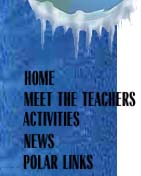
|
|
Recommendations for Success
Recommendations for Success
The following suggestions originate from TEAs and PI's involved in past years:
- Include the TEA as a field team member because you wish to share the polar research experience with a teacher who will translate the research experience into the classroom in innovative ways. Do not include a TEA because you feel it will look good in your next proposal or because you want "free labor."
- Recognize that the specific research is only part of the equation. Equally important are the broader aspects of polar science and the process of science. It is hoped that the TEA, in his/her science classroom and with his/her colleagues, will emulate how science is conducted, rather than just present the specific research content.
- Think of the TEA as an in-coming graduate student. You probably will need to invest time to "bring him/her up to speed." If the PI will not have time to train and interact with the TEA, a research-mentor can be designated to be available throughout the season to answer the TEA’s questions, encourage research discussion, and help them integrate as a team member. This research-mentor should be identified early and not changed. Remember that the PI ultimately is responsible for the success of the interaction; choose research mentors carefully.
- Recognize that the TEA is a teacher of science -- NOT a scientist
- Prepare the TEA with appropriate background and challenge them to integrate and extend this knowledge.
- Encourage questions. Answer with candor/completeness. "We don't know" is more satisfactory than: a) no answer; b) "you're not smart enough to get it;" c) complete B.S.
- Work with the TEA to define a specific component of the research that is the responsibility of the TEA and, of possible, aligns with the TEA’s interests/background. Do not plan for the TEA to "hang out" and fill in the holes as they are identified or to conduct research on their own.
- Expect the TEA to be a team member to help advance your research. Share your expectations of the research effort with the TEA.
- Keep the TEA in the loop frequently before, during, and after the field season about research questions, schedules, logistics, etc. Communicate, communicate, communicate!
- Recognize that the TEA is a professional from another field - a teacher; encourage integration and respect among all members of the research team. Have the TEA share about the TEA Program and their own experiences in science. Take advantage of what the TEA may have to offer -- ideas for outreach, teaching strategies, etc.
- Recognize and respect that there are differences in the cultures of science and teaching. Discuss these with the TEA and address where they may lead to challenges when working together.
- Recognize that the TEA has additional responsibilities (daily journals, e-mail dialog with students) that require a time investment, but also bring recognition to your team’s research (fame; possible fortune). Allow time for these NSF/TEA responsibilities.
- Recognize that this IS a special opportunity for the TEA - even "if you’ve seen one penguin or grizzly, you’ve seen ‘em all." If an opportunity arises to enhance the polar experience (without hurting the research effort) by visiting a special place or doing something a little out of the ordinary - do it!
- Realize that the TEA may not have arranged for travel in association with an institution. Assist them in the travel arrangements. Cover as many costs up-front as possible (e.g., flights, hotel). Reimburse the teachers ASAP; recall that teacher salaries often are not large!
Return to the Researcher Information Page
|


